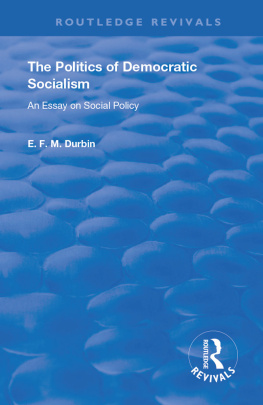Routledge Revivals
The Politics of Democratic Socialism
The Politics of Democratic Socialism
An Essay on Social Policy
E. F. M. Durbin
First published in 1940 by George Routledge & Sons, Ltd.
This edition first published in 2018 by Routledge
2 Park Square, Milton Park, Abingdon, Oxon, OX14 4RN
and by Routledge
52 Vanderbilt Avenue, New York, NY 10017, USA
Routledge is an imprint of the Taylor & Francis Group, an informa business
1940 Taylor & Francis
All rights reserved. No part of this book may be reprinted or reproduced or utilised in any form or by any electronic, mechanical, or other means, now known or hereafter invented, including photocopying and recording, or in any information storage or retrieval system, without permission in writing from the publishers.
Publishers Note
The publisher has gone to great lengths to ensure the quality of this reprint but points out that some imperfections in the original copies may be apparent.
Disclaimer
The publisher has made every effort to trace copyright holders and welcomes correspondence from those they have been unable to contact.
A Library of Congress record exists under ISBN:
ISBN 13: 978-0-367-14079-3 (hbk)
ISBN 13: 978-0-429-03007-9 (ebk)
THE POLITICS OF DEMOCRATIC SOCIALISM
By the same author
PURCHASING POWER AND
TRADE DEPRESSION
THE PROBLEM OF CREDIT POLICY
SOCIALIST CREDIT POLICY
HOW TO PAY FOR THE WAR
with E. J. M. Bowlby
PERSONAL AGGRESSIVENESS AND WAR
THE POLITICS
of
DEMOCRATIC
SOCIALISM
An Essay on Social Policy
BY
E. F. M. DURBIN
FIRST PUBLISHED 1940
PRINTED IN GREAT BRITAIN IN THE CITY OF OXFORD
AT THE ALDEN PRESS
CONTENTS
An account of recent investigations into the causes of warfare
An analysis of recent trends in the development of the British economic system
A critique of Communist political theory
An examination of the argument for the method of political democracy
A discussion of the political programme of a democratic Socialist party
INDEX
LIST OF SECTION HEADINGS
THE intellectual debts I have incurred in the course of writing this book are too great ever to be repaid. My friends have written this book for me. Without their help my task would have been unmanageable and each Part of the book is the result of an invaluable collaboration with someone else.
I am particularly indebted to a continuous co-operation with Dr. Bowlby for the subject matter of of the book is, in any important sense, my own.
I have a further debt to acknowledge to the various research assistants, whose voluntary labour made my own work possible. Miss Nadine Hambourg (now Mrs. T. H. Marshall) helped me with the historical sections of ), and she has helped to see the book through the Press.
Finally I must thank Mr. Reginald Bassett, Mr. Hugh Gaitskell and Professor Tawney for reading the book for me and for making criticisms and suggestions, most of which are embodied in the present text of the book.
It is only necessary to add that none of these persons is necessarily in agreement with, or responsible for, any particular thing that I have written. My debt to them all is none the less for that.
E. F. M. DURBIN
Nov. 1939
NOTE. I am indebted to the publishers of this book for permission to reproduce certain passages from my article in Personal Aggressiveness and War, also published by them (contained in of this book), and to the editor and proprietors of the Economic Journal for permission to reprint a few paragraphs from my article Methods of Research published in that journal in 1938 and embodied in the Introduction to this book.
E. F. M. D.
TO MY FRIENDS
E. J. M. B.
M. M. P.
R. B.
R. F.
R. H. T.
H. T. N. G.
THE conclusion which the argument of this book suggests is the entirely unoriginal one that democratic socialism, properly understood, is the best cure for poverty and the best method of furthering the happiness of the human race
DOUGLAS JAY The Socialist Case
IT is not easy to justify the writing of this book. There is an immense literature dealing with socialism already in existence. How can the writing of another book upon such a hackneyed subject be defended?
To make matters worse, I propose in this book to cover a number of subjects usually treated in separate books by different specialists. I intend to touch upon social psychology, economic history, Marxist doctrine and the academic subject of politics within the covers of this present volume, and I hope to write a second volume dealing with the economic aspects of socialism in the future. And this I propose to do, despite the fact that I have no technical competence in any of those fields, except the last. I am no psychologist. I can pretend to no scholarship in the vast literature of Marxian thought, and I have no more knowledge of political philosophy at my command than the ordinary student of the Honours School of Philosophy, Politics and Economics in the University of Oxford may be expected to possess. It will not be surprising if I fail in the self-appointed task of presenting systematically the case, as I understand it, for the maintenance and extension in our society of the twin principles of democracy and socialism.
The only reason for attempting to write this book, and the only justification that I can offer for doing so, is that I could not help myself. I write under compulsion the compulsion to explain and defend the views about social and economic policy that I believe to be true and I can only hope that to some readers the justification will seem adequate.
The compulsion to write a systematic treatise on democracy and socialism arises, in my mind, from two sources first the collapse of the social hopes in which, as a young man, I grew up, and secondly, the growing certainty that the problems of social policy can only be solved by the combination, in some form, of the many social studies at present separated from each other.
I propose to say a word about each of these reasons in turn, since an account of them will do a great deal to explain the purpose and structure of this book.
The world in which I grew up was the post war world of the 1920s. At the time it seemed an age of complex maladjustment. In Europe the heritage of the war and of the Treaty of Versailles had left us with the baffling international problems of reparations and disarmament. In Great Britain we were faced by a contracted export market, a hard core of permanent unemployment, a greatly strengthened and militant Labour Movement, and a marked weakness in the foreign exchange market. These matters seemed grave at the time, and they came to a head in the serious crisis of the General Strike in 1926. Happily we survived that dangerous experience without social disaster.
Looking back upon this period now, late in the thirties, it seems to have been an idyllic pause for rest and recuperation sandwiched between two horrible nightmares. It was, as we now see, characterized by the existence of the two fundamental bulwarks of our social happiness democracy and peace. Democracy was not in serious danger, and peace was not in serious danger at least in Europe. The area of Europe governed under constitutions providing for some responsibility to the people had been greatly extended by the revolutions immediately following the war, and the dissatisfied powers in Europe were either surrounded, or disarmed, or both. It was then still reasonable to believe that the League of Nations could, and to hope that it would, be used to restrain the aggressive nations from obtaining their ends by force.













